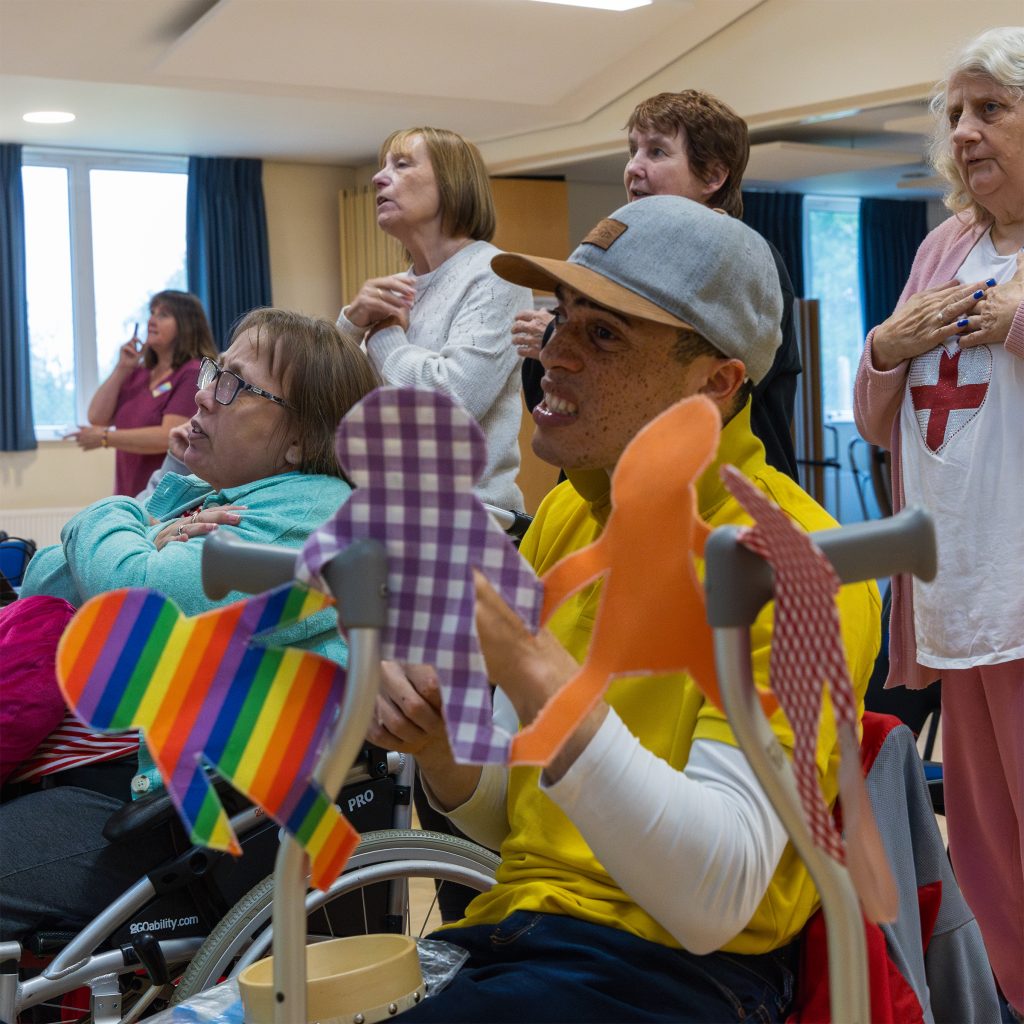
Now retired, Anne spent her long career as a youth worker and teacher bringing the joy of music to hospitals and schools in Epsom, south London and Uganda. Two years ago Anne joined Include.
Now retired, Anne spent her long career as a youth worker and teacher bringing the joy of music to hospitals and schools in Epsom, south London and Uganda. Two years ago Anne joined Include.
Volunteering in inclusive communication
When I heard about Include I was so pleased to see music combined with Makaton back in Epsom. I believe so much in the power of music for mental wellbeing. Because I enjoyed previous experiences so much, I wanted to know more about this initiative. I’ve done some performances with The Include Choir, including the Ashley Centre and train station in Epsom and Bourne Hall in Ewell, and I go on Stroll and Sign walks most months.

Communication is a basic human need that enables self-expression and the ability to relate to others and make sense of experiences.
Thanks to groups like the Include Choir, progress is being made towards a more inclusive society and the Include leadership is inspirational.

A passion for music
I didn’t have the opportunity to learn how to play a band instrument as a child although I always enjoyed listening to live music. While teaching at a secondary school I supported the concert band and was inspired by a couple of teachers who were learning how to play the saxophone. It made me realise it’s never too late to learn and I decided to have clarinet lessons. I also play the ukulele and since retiring I really enjoy playing with a concert band.
A couple of years after doing teacher training at University of Wales Trinity St David I was teaching at a primary school in Lambeth, where I was also deputy head. While there I had the opportunity to study the Orff method of teaching music for a year on day release at the University of Roehampton. This method uses speech, dance, singing, drama, movement and using percussion instruments and is an inclusive approach to music education that is good for all ages and musical abilities.
Communication and self-expression
Pupils in my school were very responsive to the Orff method of learning music and a highlight was performing at the Royal Festival Hall in London. Some years later I taught basic skills and music at St Ebba’s and the Manor in the Epsom hospital cluster (a group of hospitals) and the community. They had high quality instruments and lessons were very popular. The students were enthusiastic and the community was very supportive. Using the Orff method in my music classes allowed students to communicate and express themselves, gain confidence, explore emotions, build self-esteem and have an enjoyable and fun time.
Using Makaton

I first learnt Makaton when I attended a day course led by Margaret Walker, a founder of Makaton. I was then able to integrate this method of communication into my teaching. I also taught key vocabulary to staff and support workers so they were able to communicate with the learners. I taught Makaton while teacher training in primary schools and supporting staff at Elizabeth House, an amazing residential centre for children and young people in Mukono, Uganda, with wonderful dedicated and inspirational staff.
Include highlights
The Include Choir performances are always a highlight, seeing the audience’s reaction. Also seeing the enjoyment, confidence, sense of belonging and increased communication skills that members get from taking part in Include activities. Include is a great group to belong to for those with and without communication difficulties. I’d encourage everyone to challenge themselves to learn Makaton and enjoy the benefits of music and walking with a group of such kind and understanding people.

Find out how to get involved with Include here:
Stroll & Sign walks: Stroll and Sign | Include.org
The Include Choir: The Include Choir | Include.org
Or email info@include.org to find our more about our Makaton training

Communications, Fundraising and Partnerships Lead
